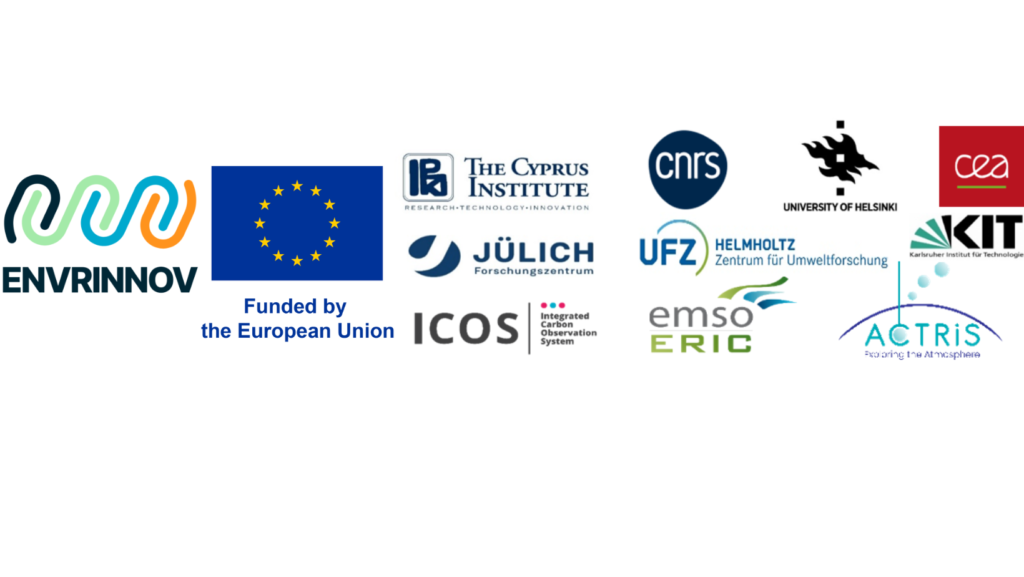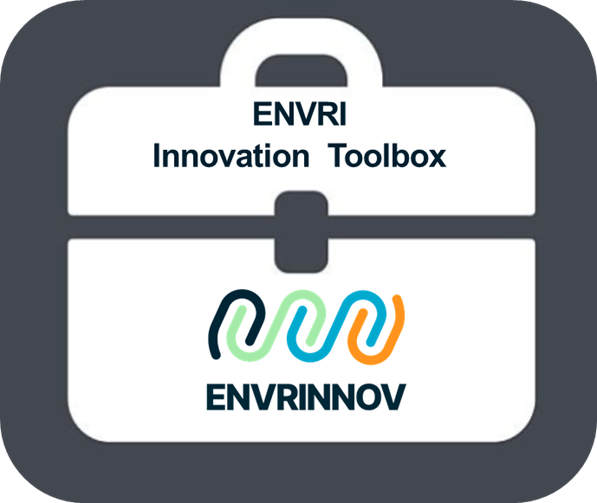The ENVRINNOV project is excited to introduce the “ENVRI Innovation Resources Toolbox”, an essential component of a new section to be established on the ENVRI-HUB on “Innovation Resources for the ENVRI community”.
The Toolbox will offer open access to tools and resources to support innovation activities for, and by, the ENVRI community. It aims to provide tailored guidelines, templates, and best practices that will help ENVRIs navigate the entire innovation process. This includes generating ideas for new products or services, technology development, technology transfer and commercialization. It will also provide resources to build partnerships for innovation with stakeholders outside the ENVRI community and focus on enhancing collaboration with industry.
The aim is for the toolbox to be used by ENVRI community members across different roles, in RIs and RPOs. For instance, those who work in the development or adoption of new technologies and services or participate in innovation projects. Innovation policy and collaboration resources may also benefit RI Head Office management and administration, along with those involved in external engagement e.g. Industrial Liaison Officers (ILOs), Industrial Contact Officers (ICOs), and Outreach Officers.
To ensure that the contents of the toolbox meet the diverse needs of all ENVRI stakeholders, it is being designed through a bottom-up approach. The initial version of the toolbox is being developed by the ENVRINNOV consortium, which includes RIs from all four ENVRI subdomains at varying maturity levels. The toolbox will then be refined through a call for feedback and input from the wider community.
Once launched on the ENVRI-HUB, the Toolbox, complemented by additional Innovation supporting features such as the ENVRI Innovation Training Program (currently under development), will serve as an essential platform for fostering innovation by, and for, the ENVRI community.
Toolbox Contents
The first preliminary draft of the ENVRI Innovation toolbox has been recently developed by the ENVRINNOV consortium. It is currently an offline iteration, that will be developed further and digitalized on the ENVRI-HUB. More details about the toolbox here.
Its preliminary content structure is summarized below.
- Collaboration tools: Resources to support the facilitation of collaborations with different types of stakeholders for innovation purposes, such as:
-
-
- Collaboration Checklist: a practical tool with critical steps to consider towards a successful collaboration (e.g. needs assessment, identification of stakeholders, collaboration agreements).
- Collaboration canvas: a practical tool to be used at the stage of initial engagement with partners to help define the what, who, and how of the collaboration.
- Networking Tools: including a list of events, conferences, web tools for networking, partners’ search and outreach (pan-European, per domain, per technology sector).
- Funding opportunities: relevant to specific collaboration models (e.g. per TRL level, Public-private partnerships, etc.).
- Agreement templates: Collaboration and confidentiality agreements templates and guides, such as Non-Disclosure Agreements (NDA), Memorandum of Understanding (MoU), and Data or material transfer agreements.
- Success stories: compilation of collaboration success stories from across the ENVRI community to highlight and demonstrate the positive impact ENVRIs had in different sectors.
- Innovation self-assessment and step-guide tool: A practical tool that will assist RIs in initiating and planning new collaborations with partners (RIs/RPOs, companies, governmental bodies) based on the technology or service need, and considering critical points for success (TRL level, development needs, agreements/contacts needs, disclosure and IP protection needs, etc).
- Innovation collaboration model’s matrix: A summary of collaboration models that could occur with and within the ENVRI community. Identifying the most relevant model of collaboration can help accelerate a successful innovation process and facilitate an efficient business plan. It can also assist in considering the different stakeholders that ENVRIs could collaborate with on matters of innovation, and the end users of their results. The outline can be shown in this table here.
-
- Technology Development tools: Resources supporting the Technology Development process, such as:
-
-
- Technology Readiness Levels (TRLs) assessment tool. The TRL is a necessary assessment for a specific technology in any innovation process stage, whether you are looking for funding, looking to initiate a co-development partnership, planning further technology development or want to assess your ready-to-market product.
- Technology Development case studies: from across the ENVRI community, to highlight success stories and best practices. An open call to gather input from across the ENVRI community will be issued as part of the ENVRINNOV project.
-
- Technology Transfer Tools: Resources to support commercialization or other type of Technology Transfer, and Intellectual Property Rights (IPR) Management, including:
-
-
- Introduction to Technology Transfer (web resources, guidelines).
- Agreement templates (collaboration agreements, confidentiality agreements, material transfer agreements, data transfer agreements, website resources, guidelines).
- Introduction to IPR Basics (web resources, available online webinars, guidelines).
- IPR Management (web resources, available online webinars, guidelines).
- IP in Open Science and Open Innovation guidelines.
-
- Additional Resources: relevant to Innovation Support, such as:
-
-
- Digital innovation platforms and toolboxes by other European and global clusters.
- Labels and standards: relevant certifications that may enhance trustworthiness to boost collaborations and marketability and facilitate commercialization.
-
Get Involved!
Are you interested in getting involved in the development of innovation resources for the ENVRI community? Join the ENVRINNOV project mailing list, by signing up here.
In the coming months, we will issue calls of interest for individuals interested in testing the first digital version of the Innovation Resources Toolbox, and/or to participate in the Innovation Training Program developed by the ENVRINNOV project. Make sure you’re in the know by joining our mailing list.
About the ENVRINNOV project
The ENVRI Innovation Resources Toolbox initiative is part of the ENVRINNOV project. ENVRINNOV is working towards co-designing, testing, and validating an Innovation Roadmap for the ENVRI community. This roadmap will set a pathway to establish and operate an ENVRI Innovation Hub (EIH), that will support the development of advanced technologies and services.
The ENVRINNOV project was motivated by the “ESFRI Strategy Working Group on the Environment” Landscape Analysis which highlights the need for coordinated innovation to address current and future technological gaps in the environmental domain. It also considers needs identified in previous ENVRI-cluster initiatives (ENVRI-FAIR, ENVRI PLUS), ENVRINNOV will address these by establishing the EIH, a centralized platform to drive innovation across the entire ENVRI community. For more information, visit the ENVRINNOV project webpage.
Contact
ENVRINNOV Project coordinators: Marina Papageorgiou (m.papageorgiou@cyi.ac.cy), and Jean Sciare (j.sciare@cyi.ac.cy), or for the Innovation Resources Toolbox task: Maria Prantsidou (m.prantsidou@cyi.ac.cy)
This news item was developed in alignment with ENVRINNOV Milestone MS3.1: Innovation Resources Toolbox (First Version) (M9). The ENVRINNOV project has received funding from the European Union’s Horizon Europe research and innovation programme under grant agreement no 101131426. Views and opinions expressed are however those of the author(s) only and do not necessarily reflect those of the European Union or REA. Neither the European Union nor the granting authority can be held responsible for them.



